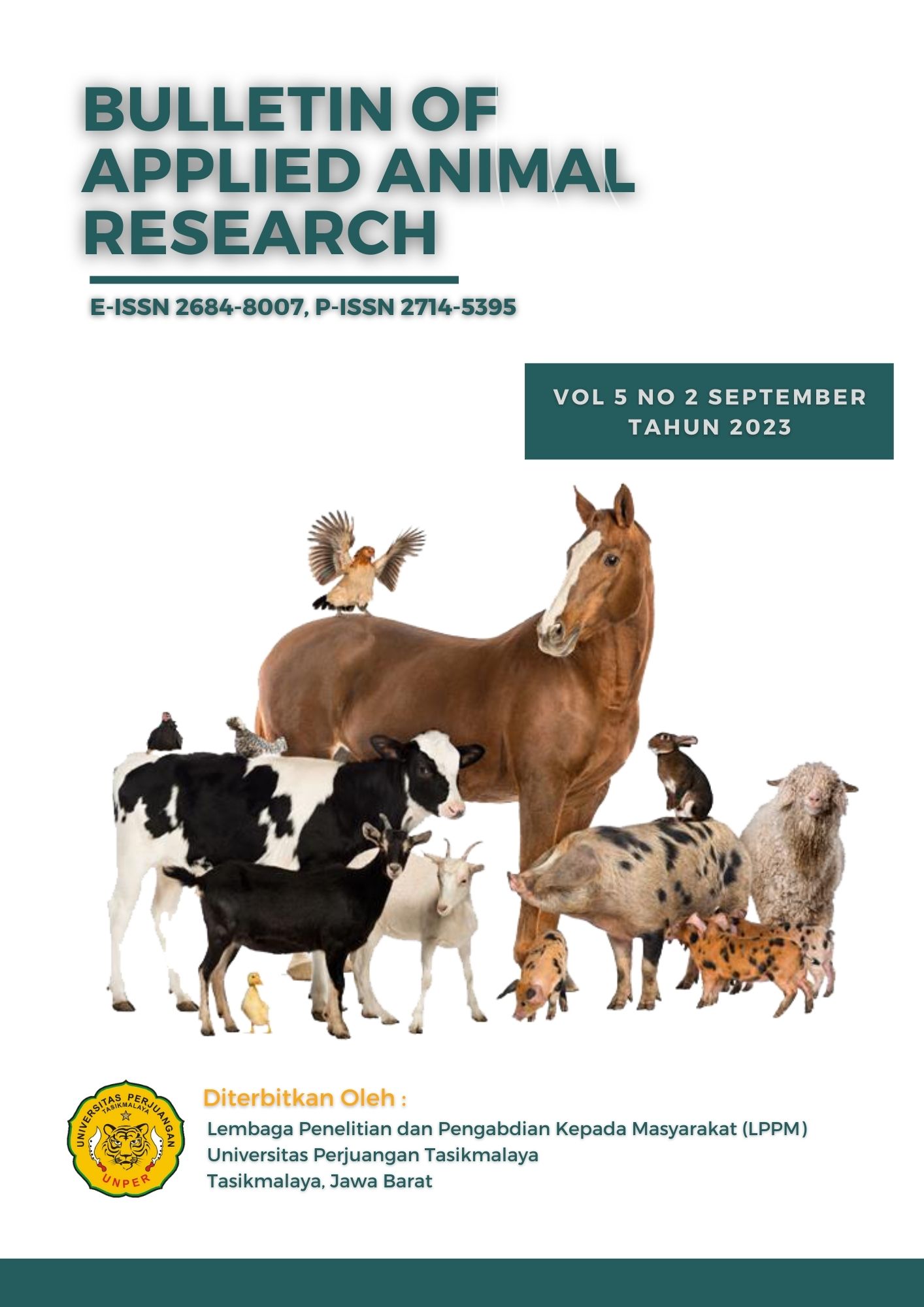Effect of Bioculture on Drinking Water on Feed Consumption and Average Daily Gain (ADG) of Fat Tailed Sheep
DOI:
https://doi.org/10.36423/baar.v5i2.1255Abstract
Body weight is the main productivity parameter in sheep as a beef cattle. Bioculture is a prebiotic that is made from spices and fruits which are extracted and dissolved with mollases and probiotic starter. Bioculture is believed to be able to increase the performance and productivity of sheep. This research was conducted to examine the effect of giving bioculture to drinking water on feed consumption and average daily gain for sheep. Twelve months old male fat tail sheep as many as 18 were reared for 6 weeks. The research method used was experimental with a Cross Random Design (CRD), consisting of 3 treatments with 6 replications of 6 samples. The treatment consisted of P0: 60% odot grass + 40% concentrate (control); P1: control + 0.5% bioculture; and P2: control + 1% bioculture. The data were analyzed using Kruskal Wallis test. The results showed that the addition of bioculture in drinking water had a significant effect on consumption P<0.05. The higher the level of bioculture, the higher the feed consumption. On the other hand, giving bioculture had no significant effect on average daily gain of sheep P>0.05. This study shows that bioculture can increase feed consumption, but has not been able to increase the average daily gain of fat-tailed sheep.
References
Azizah, N.K., Sarmanu, B. Utomo, E.K. Sabdoningrum, W.P. Lokapirnasari, and K. Supranianondo. 2020. Pengaruh probiotik bakteri asam laktat dalam air minum terhadap konversi pakan ayam broiler. Journal of Basic Medical Veterinary. 9:86-91.
Badan Pusat Statistik Indonesia. 2021. Statistik Indonesia 2021. Badan Pusat Statistik.
Chuzaemi, S., M. H. Natsir., O. Sjofjan, and A. Muttaqin. 2020. UMMB temulawak (Curcuma xanthorrhiza) sebagai suplemen pakan ternak ruminansia. Jurnal Nutrisi Ternak Tropis. 3:23-29.
Firman, A., L. Herlina, and S. Yulianto. 2019. Analisis low external input sustainable agriculture (leisa) pada ternak domba di kawasan agribisnis desa ternak, Desa Cintalaksana Kecamatan Tegalwaru, Kabupaten Karawang. Jurnal Pemikiran Masyarakat Ilmiah Berwawasan Agribisnis. 5:124-133.
Hafidz, R.A., and J. Hamidah. 2021. Educational herbal drinks to increase body immunity. Prosiding Pengembangan Masyarakat Mandiri Berkemajuan Muhammadiyah, Banjarmasin, September 20, 2021. P. 729-733.
Harjanti, D.W. 2017. Pengaruh pemberian ekstrak daun pepaya (Carica papaya Linn) dan kunyit (Curcuma domestica) terhadap fermentabilitas rumen sapi perah secara in vitro. Agromedia. 36:114-122.
Kusumaningrum, C.E., T. Wahyono, and Suharyono. 2013. Pengaruh penggunaan pakan komplit berbasis limbah tanaman jagung dan sorgum pada produktifitas ternak domba. Seminar Nasional Teknologi Peternakan dan Veteriner, Medan, September 3-5, 2021. P. 356-362.
Plumeriastuti, H., P. Hastutiek, L.T. Suwanti, W.M. Yuniarti, N. Triakoso, and Arimbi. 2018. Pemanfaatan temulawak molases blok untuk meningkatkan performance kambing yang terinfeksi cacing saluran pencernaan di Wonorejo, Kecamatan Wates, Kabupaten Kediri. Journal of Parasite Science. 2:77-81.
Praja, H.M., A.A. Nurmeidiansyah, and D. Heriyadi, 2020. Rataan bobot sapih dan pertambahan bobot badan domba garut dari lepas sapih hingga umur 8 bulan di UPTD BPPTDK Margawati 2014-2016. Jurnal Produksi Ternak Terapan. 1:16–21.
Prasetiadi, R., D. Heriyadi, and Y. Yurmiati. 2017. Performa domba lokal jantan yang diberikan tambahan tepung kunyit (Curcuma domestica Val.). Jurnal Ilmu Ternak. 17:52-58.
Primacitra, D.Y., O. Sjofjan, and M.H. Natsir. 2014. Pengaruh penambahan probiotik (Lactobacillus sp.) dalam pakan terhadap energi metabolis, kecernaan protein dan aktivitas enzim burung puyuh. Jurnal Ternak Tropika. 15:74-79.
Pujaningsih, R.I., D.W. Harjanti, B.I.M. Tampubolon, Widianto, A. Ahsan, and W.S. Pawestri. 2021. Aplikasi penambahan kunyit dan multinutrien blok plus pada ransum kambing jawarandu terhadap infestasi endoparasit dan konsumsi pakan. Jurnal Ilmu Peternakan dan Veteriner Tropis. 11:22-29.
Purnamasari, I., I.W. Sari, S. Rahayu, and M. Yamin. 2021. Substitusi rumput dengan kangkung kering dan limbah tauge serta pengaruhnya terhadap performa domba garut. Jurnal Peternakan Indonesia. 23:25-32.
Sirait, J. 2017. Rumput gajah mini (Pennisetum purpureum cv. Mott) sebagai Hijauan Pakan untuk Ruminansia. WARTAZOA. 27:167-176.
Waskito, A., and A. Kardiana. 2020. Pendugaan pertambahan bobot badan domba menggunakan metode pohon klasifikasi. Jurnal Penelitian Teknik dan Informatika. 2:174-186.
Wulandari, S., H. Subagja, and S. Mutmainnah. 2018. Pemanfaatan tumpi jagung fermentasi pada penggemukan domba jantan ekor gemuk. Jurnal Ilmiah Inovasi. 17:132-138.
Downloads
Published
How to Cite
Issue
Section
License
Copyright (c) 2023 Rahmahwati Nurazizah, Agustinah Setyaningrum, Juni Sumarmono

This work is licensed under a Creative Commons Attribution-ShareAlike 4.0 International License.












